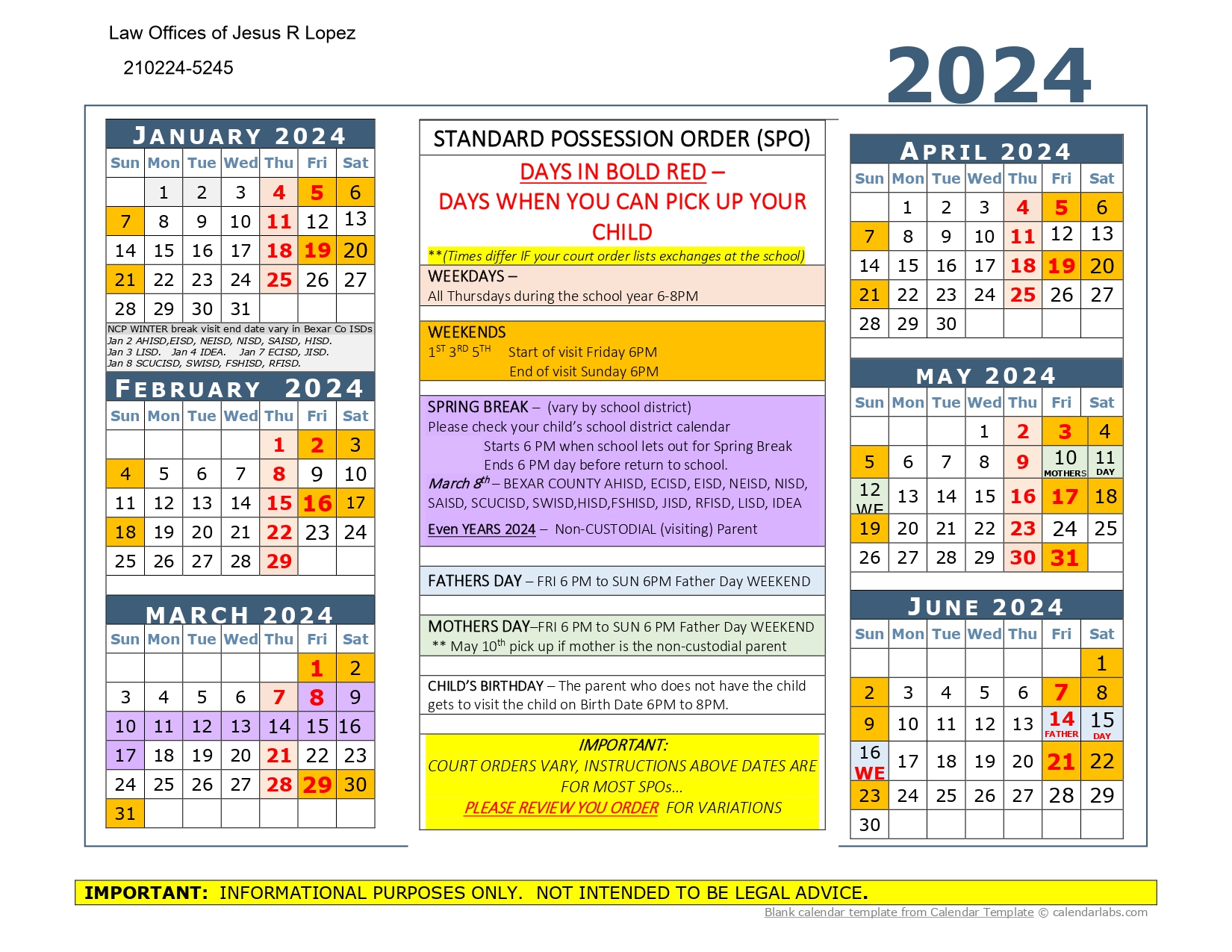Navigating the Ins and Outs of a Standard Possession Order in Texas: A Comprehensive Guide
Introduction:
Divorce or separation is often a challenging experience, and when children are involved, matters become even more complex. In the state of Texas, family law provides guidelines for child custody arrangements, and a Standard Possession Order (SPO) is a commonly used framework. Understanding the intricacies of a Standard Possession Order is crucial for parents navigating the legal landscape of child custody. In this comprehensive guide, we will delve into the key aspects of a Standard Possession Order in Texas, shedding light on its components, implications, and how it impacts both parents and children.
Understanding the Basics:
A Standard Possession Order is essentially a court-ordered schedule that dictates when each parent has access to the child. It aims to ensure both parents maintain a meaningful and consistent relationship with their children, promoting the child’s well-being while also considering the parents’ rights.
The Components of a Standard Possession Order:
- Visitation Schedule: The core of any Standard Possession Order is the visitation schedule, which outlines the specific times and dates each parent has access to the child. Typically, the non-custodial parent (the parent with whom the child does not primarily reside) has visitation rights, allowing them to spend quality time with the child.
- Weekend Rotations: In a Standard Possession Order, weekends are often divided between the parents. The non-custodial parent usually has possession of the child on the first, third, and fifth weekends of each month.
- Holiday Rotation: Holidays are significant occasions, and the SPO addresses this by allocating specific holidays to each parent on a rotating basis. Major holidays, such as Christmas, Thanksgiving, and Independence Day, are typically alternated between the parents.
- Summer Possession: The summer months provide an extended period for the non-custodial parent to spend more time with the child. The Standard Possession Order outlines a specific schedule for the summer break, ensuring both parents have ample time to create lasting memories with their children.
- Communication and Flexibility: A well-crafted Standard Possession Order acknowledges the importance of effective communication between parents. It may include provisions for phone calls, video chats, and other means of staying in touch when the child is with the other parent. Additionally, the order may allow for flexibility in the schedule to accommodate special events or unforeseen circumstances.
The Impact on Parents and Children:
- Emotional Impact: The emotional toll of a divorce or separation on parents is profound, and the Standard Possession Order can exacerbate these feelings. Both parents may struggle with the limited time they have with their children, leading to heightened emotions and potential conflicts.
- Child’s Perspective: From the child’s perspective, a Standard Possession Order can be challenging as well. Adjusting to a new routine, different living arrangements, and spending time away from one parent can be emotionally taxing. It is essential for both parents to prioritize the child’s emotional well-being and foster a supportive environment.
- Co-Parenting Challenges: Co-parenting requires a high level of cooperation and communication. A Standard Possession Order, while providing structure, may also introduce challenges in coordinating schedules, addressing conflicts, and ensuring consistency in parenting styles between households.
Conclusion:
Navigating a Standard Possession Order in Texas is a complex process that involves legal, emotional, and practical considerations for both parents and children. While it provides a structured framework for visitation, it is crucial for parents to prioritize the best interests of their children and work towards fostering a positive co-parenting relationship. Seeking legal advice, maintaining open communication, and prioritizing the child’s well-being are essential steps in successfully navigating the challenges posed by a Standard Possession Order.
In Texas, the Standard Possession Order (SPO) includes specific provisions for parents who live within 50 miles or less of each other. This proximity is considered a “geographic restriction,” and the visitation schedule is designed to accommodate the relatively short distance between the parents’ residences. Here is an overview of the visitation schedule for parents who live 50 miles or less from each other in Texas:
- Weekend Rotation:
- The non-custodial parent (the parent with whom the child does not primarily reside) is typically granted possession of the child on the first, third, and fifth weekends of each month.
- The weekend visitation typically begins on Friday evening and extends until Monday morning.
- Weekday Visitation:
- In addition to weekends, the non-custodial parent may have visitation rights on one evening per week. This allows for mid-week contact and involvement in the child’s daily routine.
- Holiday Rotation:
- The Standard Possession Order addresses major holidays and allocates specific holidays to each parent on a rotating basis. Common holidays, such as Christmas, Thanksgiving, New Year’s, and Independence Day, are typically included.
- The parent who does not have possession of the child on a particular holiday may have visitation during part of that holiday.
- Summer Possession:
- The summer months provide an extended period for the non-custodial parent to spend more time with the child. The SPO may grant the non-custodial parent possession for a continuous period, such as 30 days, during the summer break.
- Notification Requirements:
- The SPO may include provisions regarding notification requirements for the non-custodial parent. This involves providing advance notice for any changes or deviations from the regular visitation schedule, ensuring both parents are informed and can plan accordingly.
- Communication and Flexibility:
- Recognizing the importance of maintaining a connection with the child, the SPO may include provisions for phone calls, video chats, and other means of communication when the child is with the other parent.
- The order may also allow for flexibility in the schedule to accommodate special events, such as family gatherings, school activities, or other occasions.
It’s important for parents to thoroughly review and understand the specifics of the Standard Possession Order issued by the court. Additionally, parents may choose to customize certain aspects of the visitation schedule through mutual agreement or court approval, as long as it aligns with the best interests of the child. Seeking legal advice is essential to ensure compliance with Texas family law and to address any unique circumstances that may arise in the co-parenting relationship.




